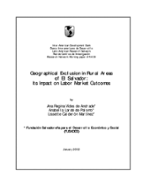Geographical Exclusion in Rural Areas of El Salvador: Its Impact on Labor Market Outcomes
Date
Jan 2002
The main objective of this study is to examine the impact of geographic isolation of individuals living in El Salvador's rural areas on three labor market outcomes: labor force participation decision, sector of employment, and labor income. In this study, it is hypothesized that living in geographic isolation has a negative impact on rural workers' labor outcomes. The main results of this study indicate that the degree of geographic isolation does not discourage men from working; on the contrary, men living farther away from urban and maquila jobs are more likely to work. However, women living in greater isolation are highly concentrated in own-production agricultural activities, where women's skills are rewarded less than comparable men's skills. Through concentration into this sector, women living in geographic isolation obtain worse labor outcomes than men. When working in own-account nonagricultural production, geographic isolation also has a negative impact on men's labor income.



